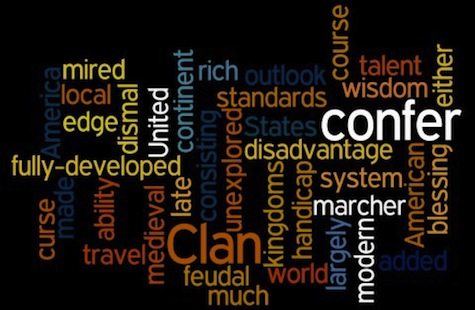There’s nuts and bolts science fiction, and then there’s science fiction where the ideas are all drawn from some other field. In the case of the Merchant Princes, underneath the second world fantasy meets techno-thriller car-crash, there’s a science fictional examination of a topic that seldom gets air-play: the political determinants of economic development and industrialization.
The world of the Clan is mired in a classic development trap—a situation that prevailed for the vast mass of humanity until roughly 1800, and which we have no actual deep understanding of how to break out of. All we really know is that, prior to 1700 or thereabouts, Great Britain was economically not very far out of line with the rest of western Europe. But by 1860 the UK had achieved a mind-boggling industrial Great Leap Forward, becoming the first truly modern superpower: with naval basing rights in 130 other countries, a navy larger than the two next largest combined, and a staggering 60% of planetary GDP, it occupied much the position in the late 19th century that the USA occupied by the late 20th century.
 Since then, other nations have undergone similar development leaps. Japan, in 1860, was not obviously very post-medieval; by 1920 they were building aircraft carriers. The USSR electrified and industrialized in two decades flat, despite grossly poor management and a simultaneous reign of terror. Yet other parts of the world stagnated and failed. North and South Korea started off roughly parallel in 1953—both had been mashed flat by war and were run by military dictatorships—but by 2003, South Korea had achieved per-capita income equivalence with the likes of modern Japan and Germany; meanwhile, North Korea has problems feeding its own people.
Since then, other nations have undergone similar development leaps. Japan, in 1860, was not obviously very post-medieval; by 1920 they were building aircraft carriers. The USSR electrified and industrialized in two decades flat, despite grossly poor management and a simultaneous reign of terror. Yet other parts of the world stagnated and failed. North and South Korea started off roughly parallel in 1953—both had been mashed flat by war and were run by military dictatorships—but by 2003, South Korea had achieved per-capita income equivalence with the likes of modern Japan and Germany; meanwhile, North Korea has problems feeding its own people.
So what drives this? It’s a weird kind of singularity: one decade you’ve got an economy trudging along in stagnation, mired in subsistence agriculture, poor or non-existent infrastructure, dysfunctional governing bodies, unenforced or arbitrarily imposed laws, and with a badly-educated population. Then you blink and the next decade they’re building skyscrapers and boasting about their first moon shot. And ten years later the first 747s full of tourists arrive in your home town, chattering and pointing out its old world charm….
The world of the Clan is, of course, mired in the late medieval feudal system. It has the added disadvantage of consisting of marcher kingdoms on the edge of a largely unexplored continent. And the Clan themselves have the dismal handicap of a talent which is as much a curse as a blessing; it has made them rich by local standards, but it doesn’t confer wisdom, and the ability to travel to the fully-developed United States of America doesn’t confer a modern American outlook either.
So, for contrast, I decided to throw in another time line.
The New British Empire isn’t new or British; it’s British North America, as it developed in the wake of the French invasion of England in 1759. (The groundwork for which hinges on the outcome of the ’45 Stuart uprising being different, which in turn hinges on the weather in Edinburgh on a rainy spring morning when a conference of war teeters in the balance…) The 18th century French monarchy was notoriously bad at managing its tax collection system; and the invasion of 1759 was the culmination of what should truly be described as the first world war, a conflict between Britain and France that lasted for decades, and of which the American War of Independence (in our time line) was merely a side-effect.
It’s not unreasonable to suppose that, in the wake of a successful invasion of England, the French crown would have attempted to recoup the cost of the war from the English pocket. And the imposition of regional tariff and customs barriers in England, then the largest free-trade zone in Europe, combined with a military government, would probably have thrown a damper on the first sparks of what would otherwise have become the industrial revolution. Meanwhile, in the Americas, the crown-in-exile establishes its capital in New London—formerly New York, and before that New Amsterdam—and has its own problems to deal with; notably the French in Louisiana, the Southern aristocracy (many of whom were descended from Stuart loyalists and had scant affection for a Hanoverian crown), the uppity New Englanders… which is why, when industrialization and development finally kicked off in the world of the New British Empire, it did so a century later and on the opposite side of the Atlantic from our own time line.
Finally: governance. It’s very hard to separate out the cause of development from the political climate in which it happens. It would be an over-simplification to say that democracy is a necessary precondition; the USSR is the chrome-plated refutation to that. But a despotism that doesn’t respect property rights or that meddles in corporate governance seldom works well. And feudal aristocracy seems to be downright inimical to economic development—why bother, say the princes and dukes at the top of the pile, when we already have our palaces and our private armies and expensive luxuries? It’s noteworthy that those countries that pioneered industrial development and modern capitalism did so in the wake of political eruptions that placed fetters on the unlimited exercise of state power by the crown. The British nations did so in 1649, and again in 1688; France in 1789: the USA in 1776 and again in 1788 (with its then-revolutionary Constitution). What, however, are the odds on a New British Empire based in North America putting up with the tiresome demands of Levelers and Ranters while they’re fighting a global cold war against the French Empire? Or of Louis XVI emptying his coffers when he can re-fill them at will from the spoils of England?
But some kinds of pressure simply keep on building up until they find release, and by the time Miriam stumbles into New Britain, things are getting interesting….



* * * * *
The Bloodline Feud was published last month by Tor UK, followed this month by The Traders’ War. Then The Revolution Trade, the last in these Merchant Princes omnibus editions, is published by them in June. See here for both blurbs. You can also see more posts on the Merchant Princes books, both on and by Charles Stross, on Torbooks.co.uk here. And an all-new Merchant Princes series will be along in due course, with info on that here. This post originally appeared on the Tor UK blog.
Charles Stross has worked as a pharmacist, software engineer and freelance journalist, but now writes full-time. To date, Stross has won two Hugo awards and been nominated twelve times. He has also won the Locus Award for Best Novel, the Locus Award for Best Novella and has been shortlisted for the Arthur C. Clarke and Nebula Awards.











I just read the series this year and found your take on this topic to be quite interesting. It definitely contributed to my enthusiasm for the books. Thanks for writing them and I look forward to seeing what will come next for these worlds.
Charles, as a marxist, does it bother you that the primary way that all of these societies escape their “trap” in real life, is through economic liberalization?
BTW, love the Laundry Files.
Great post. Using the exploration of economic development and various pitfalls therein is an extremely interesting world building mechanism.
“The Bloodline Feud” has been obtained and is next up in my to read pile.
Couple of thoughts from a huge fan —
1. What is a “marcher kingdom”? Stross uses this phrase in these books a fair amount, but my Google-fu isn’t strong enough to find out what it means. Wikipedia tells me that a “march” is “a border region similar to a frontier”, typically “dominated by a single country and fortified for defence against the neighboring country”. How can this definition be applied to a kingdom? Which country is the Clan’s kingdom being defended from?
2. I found New Britain to be one of the most interesting part of the original Merchant Princes series, but the lion’s share of the books take place in our world or the Clan’s world. Is this different in the revised books? If not, I hope no reader of this post gets misled about what they’re getting into.
Greatly looking forward to the sequel trilogy – hope TOR posts publication update /ballpark dates soon.